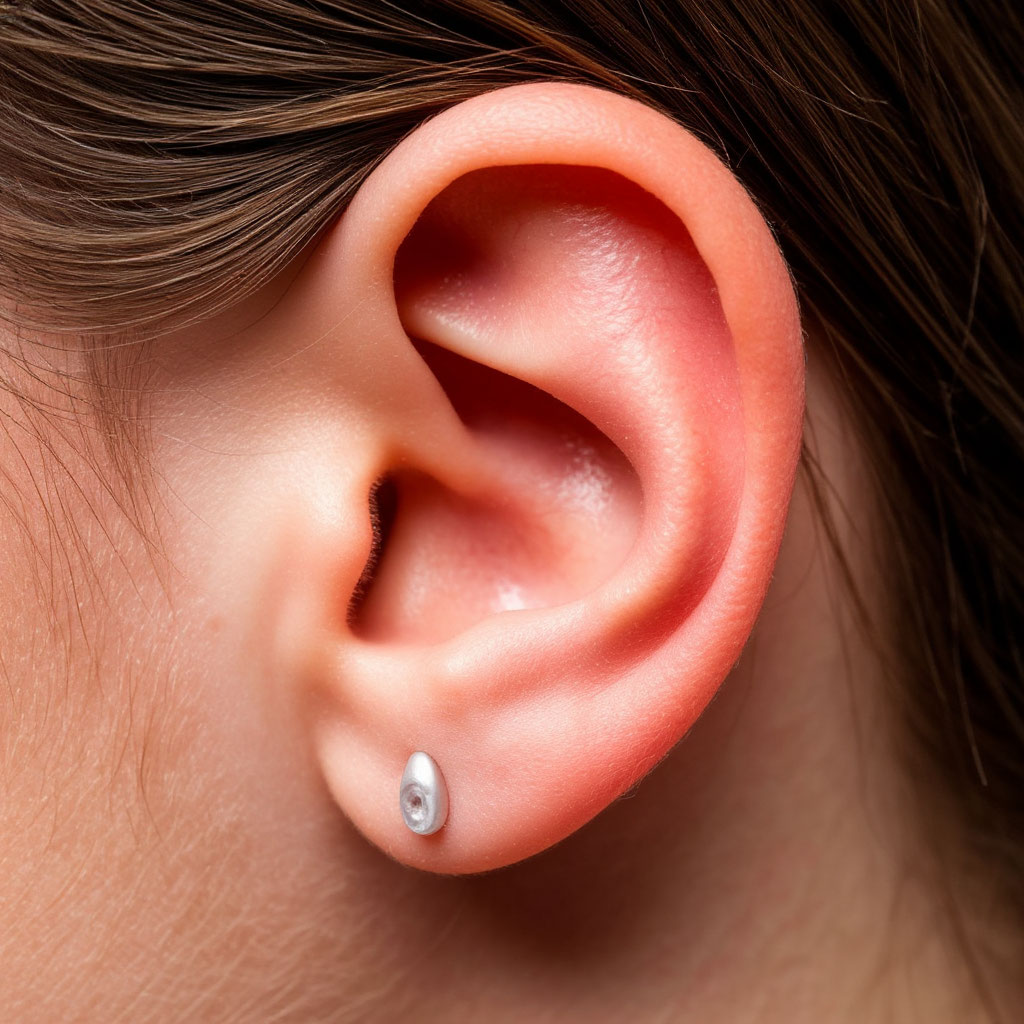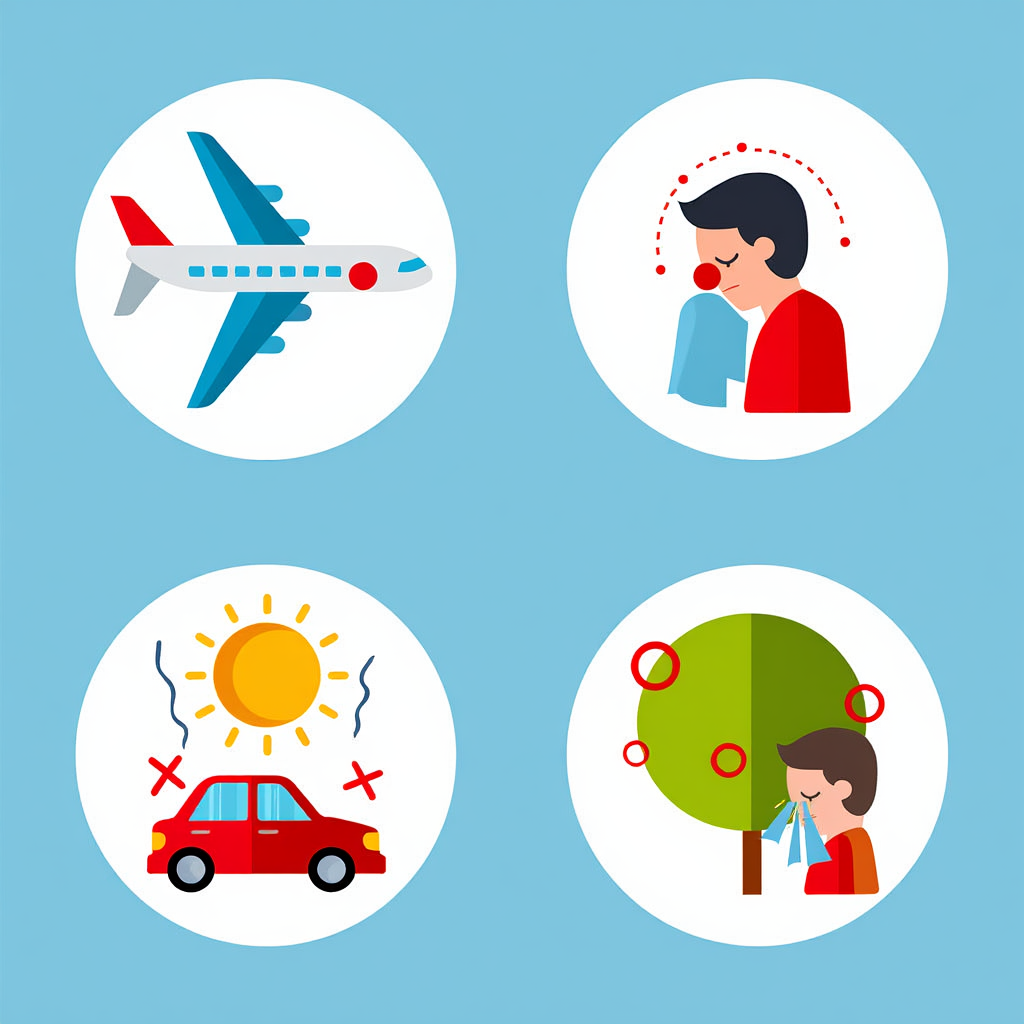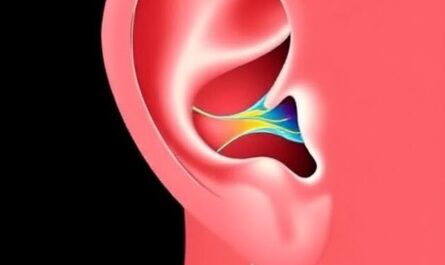Ever wonder why ears feel clogged? That strange feeling of congestion can feel like pressure, muffled hearing, or a feeling of fullness deep in your head. Some describe it as a cotton wool feeling in your ears or like the sound of being underwater. This discomfort usually occurs when the air pressure in your middle ear doesn’t match the pressure outside. It’s common with altitude, a cold, or sinusitis, and while it’s often harmless, it can sometimes lead to pain, dizziness, or even hearing problems.

How the Ear Responds to Pressure Changes
Ever get that muffled sensation in your head during a road trip? The space behind your eardrum is sensitive to the air around you, not just sound. It needs to stay balanced with the outside environment. When that balance gets off, you feel a blocked sensation. This explains why ears feel clogged in certain situations. Let’s break down how your ears handle these shifts.
The Balancing Act Behind Your Eardrum
A tiny passage connects the space behind your eardrum to your throat. Known as the Eustachian tube, it keeps air pressure steady. When the outside air shifts—like during a mountain hike or a deep swim—it adjusts to match. If this passage gets blocked, air can’t flow right. That creates a vacuum sensation, like your ears are stuffed with cotton. It’s a common hassle that can feel like a bad podcast cutting out.
What Sparks Those Pressure Shifts?
Ever notice your ears acting up in an elevator? Pressure changes hit you in everyday moments like driving through hills or even during a stormy day. The space behind your eardrum struggles to keep up with rapid environmental tweaks. Your body usually sorts this out by opening the tube. When it doesn’t, you’re left wondering why ears feel clogged. It’s like trying to hear a concert through a pillow.
Everyday Moments That Mess with Your Ears
Think about climbing a steep trail or even napping in a weird position. Altitude shifts or overnight mucus buildup can make your ears feel off. Rapid weather changes, like when a cold front rolls in, might trigger it too. These are normal reactions to small environmental changes. Your ears are built to handle them, but sometimes they need a little nudge, like popping in some earbuds to focus.

The Eustachian Tube and Its Role in Balancing Pressure
Picture a tiny pressure manager working inside your head. That’s the Eustachian tube, a narrow channel linking the space behind your eardrum to your throat. Its job is to keep air pressure balanced so your eardrum doesn’t feel strained. When it’s doing its thing, you don’t notice. But when it’s not, you’ll definitely know why ears feel clogged. It’s like a bad Zoom call with spotty audio.
How This Passage Keeps Things Smooth
The tube opens when you yawn, swallow, or chew. That’s why chomping on gum during a flight feels like a superhero move. It lets air flow to match the outside pressure. Here’s what it does to keep your ears happy:
- Opens for air flow. Swallowing or yawning pulls the tube open briefly. Air moves to balance pressure.
- Drains fluid. It clears mucus from the space behind your eardrum. This cuts infection risk.
- Closes to protect. When not in use, it stays shut to block throat germs. This keeps your ears safe.
Why the Tube Sometimes Fails
When this passage gets blocked, pressure can’t equalize. Swelling from allergies or a cold can close it off. Kids have narrower tubes, making issues more common. A blocked tube traps air, causing a heavy, muffled feeling. It’s like your ear is stuck in its own little soundproof booth. Keeping it clear is key to avoiding that sensation.
What Else Affects This Passage?
Dry air, like in a stuffy office, can thicken mucus, making drainage tougher. Smoking or secondhand smoke irritates the throat, swelling tissues near the tube’s opening. Even stress can mess things up, as jaw clenching tweaks nearby muscles. Avoiding these triggers can keep your ears from feeling like they’re underwater during a podcast. Staying aware of your environment helps a lot.

When Ear Fullness Is Normal
Feeling like your ears are plugged isn’t always a red flag. Sometimes, it’s just your body reacting to the world. Your ears handle small pressure changes daily without much fuss. Knowing when it’s no big deal can ease your mind. Most of these moments pass faster than a TikTok trend.
Pressure Shifts in Daily Life
Climbing stairs in a skyscraper can make your ears feel heavy. Swimming in a lake might trigger that blocked sensation too. These moments are usually harmless. The tube opens, air flows, and the feeling fades. You barely notice these small tweaks, like switching songs on your playlist.
Quick Fixes for Normal Ear Issues
Got that annoying clogged feeling? A few tricks can help, like swallowing hard or yawning. Here’s a table of common situations and solutions:
| Situation | Why It Happens | Quick Fix |
| Driving up a mountain | Altitude shifts air pressure | Swallow or yawn repeatedly |
| Swimming or diving | Water pressure pushes on eardrum | Blow gently with nose pinched |
| Waking up with clogged ears | Mucus buildup during sleep | Chew gum or sip water |
When It’s Just a Passing Thing
A blocked sensation often clears up fast. Hiking or riding in a car? The feeling fades once pressure stabilizes. Your body’s reflexes, like swallowing, kick in to help. The tube does its job, and you’re back to normal. It’s like rebooting your phone to fix a glitch—no big deal.
Habits to Keep Your Ears Clear
Certain tricks can prevent that heavy feeling. Staying hydrated thins mucus, helping the tube drain. Avoiding sudden temperature swings, like from a cozy café to freezing air, reduces irritation. Chewing gum during long drives keeps the tube active. Sleeping with your head slightly elevated can stop overnight buildup. These hacks are like keeping your Spotify queue ready for a road trip.
Why a Cold or Sinus Infection Affects Your Ears
A stuffy nose can throw your ears into chaos. Colds and sinus infections often cause that blocked sensation. They swell the tissues around the Eustachian tube, making it hard to work. Let’s dig into why ears feel clogged when you’re under the weather. It’s like your ears caught the same bug as your nose.
How Inflammation Causes Trouble
When you’re sick, your nose and throat get swollen. This can pinch the tube shut. Mucus buildup clogs it further, trapping air behind the eardrum. That creates ear pressure or a heavy feeling. Your ears take a hit right along with your sinuses. It’s like trying to hear your favorite show through a stuffed-up haze.
Conditions That Block the Tube
Colds aren’t the only culprits. Here’s a list of conditions that can mess with the tube:
- Allergies. Pollen or dust inflames nasal passages. This blocks the tube.
- Sinus infections. Thick mucus clogs the tube’s opening. Pressure builds up.
- Upper respiratory infections. Viruses like the flu cause swelling. This affects the space behind your eardrum.
- Tonsillitis. Swollen tonsils near the tube can block it. Air gets trapped.
How Long It Hangs Around
That blocked sensation from a cold usually fades as you recover. Once swelling eases, the tube opens again. Drinking water or using a decongestant can speed things up. Steaming your face with a warm towel helps too. If it lingers, it might hint at something more serious, like a plot twist in a medical drama.
Home Remedies to Ease the Feeling
You can tackle ear issues at home. A warm compress on your ear reduces swelling. Nasal saline sprays clear mucus from the tube’s opening. Avoiding dairy, which thickens mucus, can help. Gentle neck stretches might improve drainage. These steps are like hitting pause on a bad cold episode to feel better fast.

What Happens to Ears During Takeoff and Landing
Flights can make your ears feel like they’re staging a protest. Rapid pressure changes during takeoff and landing hit the space behind your eardrum hard. It’s a prime time to wonder why ears feel clogged. Here’s what’s going on and how to handle it. A little prep can save you from feeling like you’re stuck in a silent movie.
Why Flying Throws Your Ears Off
Airplanes shift altitude fast. As you climb or descend, air pressure changes quickly. The tube can’t always keep up. If it stays closed, your eardrum stretches, causing a vacuum sensation or pain. Landing is often worse because pressure changes hit harder. It’s like your ears are trying to listen through a foggy window.
Tips to Ease Ear Pressure on Planes
You can help your ears during flights. Try these tricks to keep the tube open:
- Chew gum. It triggers swallowing, opening the passage.
- Use the Valsalva maneuver. Pinch your nose, close your mouth, and blow gently. This pushes air behind the eardrum.
- Stay awake during descent. Swallowing while awake helps more than sleeping.
- Use filtered earplugs. These slow pressure changes, helping your ears adjust.
When Flying Causes More Than Discomfort
Ear pressure on flights is usually temporary. But if you’re congested, it’s worse. A blocked tube can lead to fluid buildup or barotrauma, where pressure damages the eardrum. If pain or a blocked sensation lingers after landing, get it checked. It’s like noticing your headphones are busted after a long flight—don’t ignore it.
Prepping for a Smooth Flight
If flying messes with your ears, plan ahead. Avoid flying with a cold if you can—it makes pressure changes tougher. Over-the-counter decongestants before takeoff can reduce swelling. Sipping water during the flight keeps mucus thin. A humidifier the night before can also help. These steps are like packing noise-canceling headphones for a better trip.
Can Ear Fullness Be a Sign of a Condition?
A blocked ear isn’t always a minor annoyance. Sometimes, it hints at something bigger. While most cases are no big deal, ongoing discomfort might need a closer look. Let’s explore when to take it seriously. Knowing the signs can keep you from brushing off a real issue.
Otitis and Ear Infections
Ear inflammation, or otitis, often causes a blocked sensation. Infections like otitis media happen when fluid gets trapped behind the eardrum. This usually follows a cold or sinus issue. The fluid creates pressure, making you wonder why ears feel clogged. Kids get this more because their tubes are shorter. Pain, fever, or hearing loss means it’s time to see a doctor.
Other Conditions to Watch For
A blocked sensation can point to other problems. Chronic allergies or sinusitis can keep the tube closed. Meniere’s disease, a rare inner ear issue, brings fullness with dizziness and ringing. Earwax buildup can mimic that clogged feeling too. If it doesn’t clear, get it checked. It’s like realizing your favorite podcast app keeps crashing—something’s not right.
When to Get Help
If a blocked sensation lasts more than a few days, don’t ignore it. Pain, hearing changes, or dizziness are red flags. A doctor can check for infections, fluid, or other issues. They might suggest decongestants, nasal sprays, or, rarely, a procedure to drain fluid. Acting early prevents bigger problems, like missing the climax of a good audiobook.
Keeping Your Ears Healthy Long-Term
To avoid chronic ear issues, keep your sinuses in check. Regular nasal rinses clear allergens. Avoiding smoky environments reduces irritation. A humidifier at home keeps air moist, helping the tube work better. Managing stress through relaxation can also help, as tension affects nearby muscles. These habits are like tuning your earbuds for crystal-clear sound.
That blocked ear sensation can drive you up the wall. Whether it’s the Eustachian tube wrestling with pressure changes or a cold stirring up trouble, your ears are sensitive to the world. Most of the time, it’s no big deal—yawning, chewing, or waiting it out usually works. But if you keep asking why ears feel clogged and it won’t quit, don’t sleep on it. Understanding what’s behind the feeling helps you know when to act. Next time your ears feel like they’re stuck in a bad Wi-Fi zone, you’ll know what to do.



